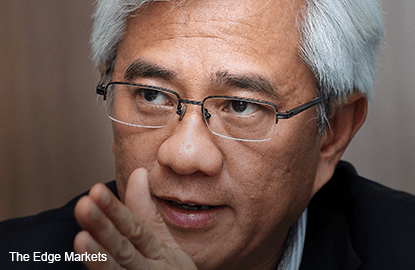
This article first appeared in The Edge Malaysia Weekly, on November 30 - December 6, 2015.
Thinning profit margins from heightened competition, plus the need to continually invest to keep up with the quality of service to satisfy customers, have become the push for marriage among providers of both fixed line and mobile phone services from Europe to Asia.
In Britain, the UK’s largest broadband provider, BT Group, has mounted a £12.5 billion takeover of mobile operator EE — some 14 years after BT spun off its mobile arm O2.
Hong Kong-based Hutchison Whampoa’s mobile operator, Three, which proposed to buy O2 from Telefonica for £10.25 billion, reportedly argued to the European competition watchdog that the Three-O2 merger should be allowed for them to better compete with BT and Vodafone.
Other proposed mergers in recent years include Wind and 3 Italia in Italy.
To be sure, not all mergers worked out. Norwegian Telenor ASA and Swedish TeliaSonera failed to merge their respective Danish mobile operations and in the US, AT&T withdrew a proposed merger bid for T-Mobile USA in 2011, following antitrust-related objections.
While regulatory issues are a concern, it is not likely to stop all marriage plans. In fact, the UK’s Competition and Market Authority said a BT-EE merger is not expected to substantially reduce competition.
For Axiata Group Bhd, president and group CEO Datuk Seri Jamaludin Ibrahim says the group continues to be for consolidation wherever it makes sense to acquire or form partnerships.
“In every country, we’re thinking proactively and reactively who to buy and who not to buy. We were thinking of Bangladesh for the last two years before we found someone to merge with. It’s the same for Indonesia and Sri Lanka,” Jamaludin says, adding that any M&A would be “opportunistic … unless it is too good to forgo”.
He qualified, though, that Axiata is “not going around with a big cheque book” for shopping, but will consider any deal that either supports its core business or expands and enhances its core competences.
“I don’t think we are going to be very aggressive … the focus is primarily consolidation. We’ve done four already. Two very small ones in Sri Lanka, one medium-sized in Cambodia, a large one in Indonesia [Axis] and we’ve just announced a MoU in Bangladesh,” he says.
Robi Axiata, Bangladesh’s second largest operator by revenue, entered into a joint venture with Trust Bank to provide mobile financial services, just weeks after announcing a partnership with digital security provider Gemalto NV.
Yet for investors looking at Malaysia, the biggest question of all is possibly whether Khazanah Nasional Bhd will decide to again merge its regional mobile champion Axiata Group Bhd with Telekom Malaysia Bhd.
With its acquisition of Green Packet Bhd’s Packet One Sdn Bhd (P1), Telekom is seen as a formidable challenger to Malaysia’s big three mobile phone operators: DiGi.Com Bhd, Maxis Bhd and Celcom Axiata Bhd. The mobile operators, in turn, lease fibre capacity from Telekom, which spent over RM10 billion on building a high-speed broadband (HSBB) network and received co-investments from the government to expand that network to areas that might not immediately be commercially profitable.
Khazanah’s decision in late 2007 to spin off Telekom’s mobile operations into today’s Axiata, created an investor favourite in Telekom as it offered steady dividends at a time of record low interest rates as it invested to build the HSBB network.
Unless it announces a policy change, Telekom continues to be the only stock on Bursa Malaysia with a minimum dividend promise — a minimum of RM700 million a year or up to 90% of its profit. Axiata, meanwhile, offers the dual proposition of growth from its investments in emerging markets with some stability in yields.
Save by subscribing to us for your print and/or digital copy.
P/S: The Edge is also available on Apple's AppStore and Androids' Google Play.